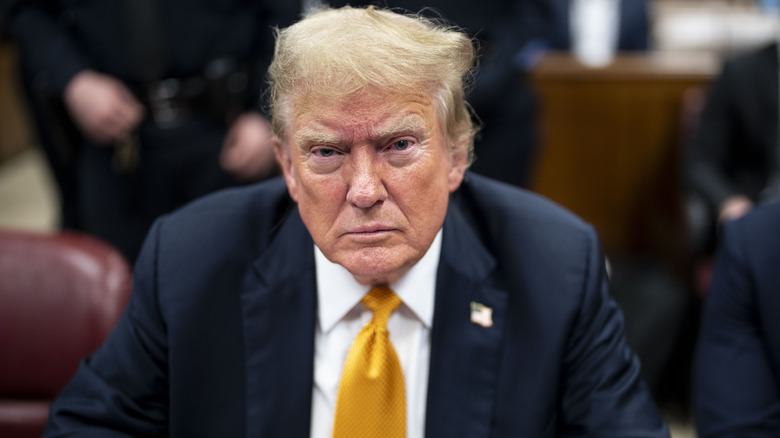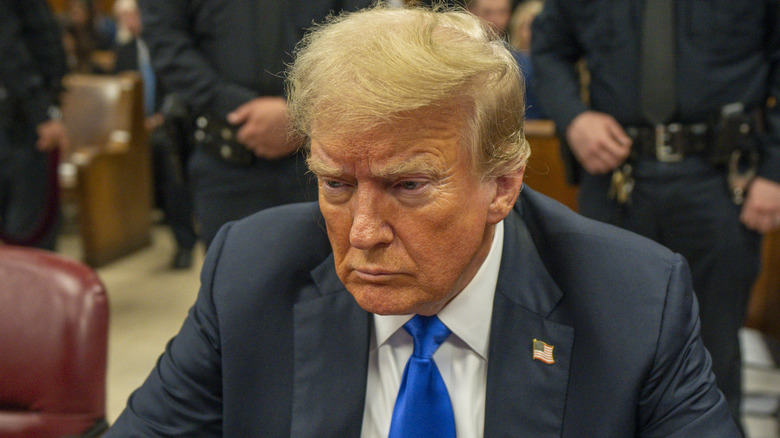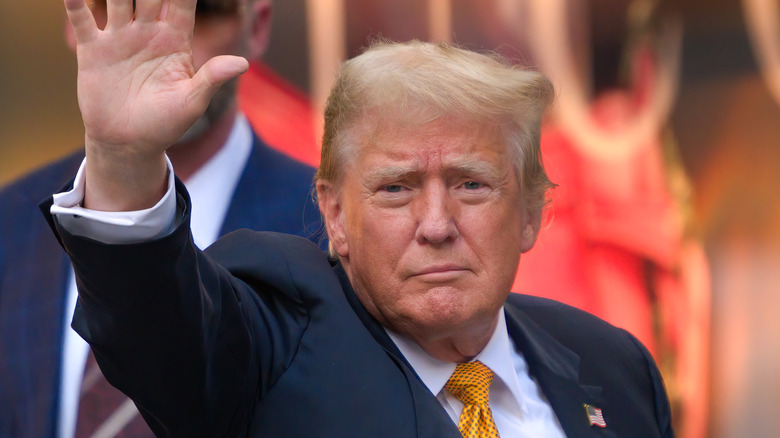Will Donald Trump Still Be Able To Run For President After His Guilty Verdict?
On May 30, 2024, former President Donald Trump was found guilty on 34 counts (out of 34 charges) of falsifying business records. This stems from an attempted cover-up of Trump's liaison with adult film star Stormy Daniels, and how money changed hands to prevent the unseemly news from leaking to the public.
Adding to the list of the things that Donald Trump was the first president to do, Trump is now responsible for another historical milestone — he's the first former U.S. president to be both tried and convicted of a felony, let alone multiple.
Politically, this raises a lot of questions. Trump's trial concluded during the middle of the presidential election cycle, after the primaries but before the political conventions where the parties officially select their nominees before the general election in November 2024. Trump cruised through the primaries and secured more than enough support to be the presumptive and all but decided Republican nominee for president. But his conviction raises some questions. Namely: Is Donald Trump still legally allowed to run for president after being found guilty of a felony? And, if elected, may he serve? Here's a look at this complicated legal and constitutional matter.
There's nothing in the Constitution that bans a felon from the presidency
The U.S. Constitution is the legal blueprint for the United States. Starting with the Bill of Rights, or the first 10 amendments, the Constitution was ratified in 1787, and Article II, Section 1 of the document (according to The National Constitution Center) provides guidelines for who can legally serve as president of the United States. These rules are airtight and also simple and straight to the point. The only qualifications for "Office of the President" are: The individual must be a natural-born U.S. citizen, they have to have been a legal resident of the U.S. for at least 14 years, and they have to be 35 years of age or older.
And that's it. There are few other passages in the Constitution where limitations are placed on who can and cannot be president. There's no federal law banning those convicted of crimes from holding the highest elected office in the land, so 34-time convicted felon Donald Trump remains eligible for the presidency because he was born in the U.S. (in Queens, New York), has resided in the country for well more than 14 years, and he's just shy of 78 years old as of this writing.
Felons can and do run for president. Across the nation's 200-plus-year history, many individuals with a criminal record declared their candidacy, including 1920 Socialist Party nominee Eugene V. Debs, who campaigned while serving a prison sentence for encouraging draft dodging.
A constitutional amendment could pertain to a Trump candidacy
While Donald Trump, or any other convicted felon, can theoretically be elected to the presidency and serve, one of the amendments to the Constitution could potentially disqualify the former president from returning to the Oval Office. Ratified in 1868 in the wake of the Civil War, the 14th Amendment made the presidency off-limits to those who "have engaged in insurrection or rebellion against the same."
Designed to keep ex-Confederate insurgents, officials, or sympathizers out of elected office, the law could be applied to Trump. He's facing legal repercussions over his role in the January 6, 2021, U.S. Capitol building attack in which Trump supporters attempted to stop the certification of the election that removed him from office in favor of Joe Biden. That event has been classified as an insurrection and a rebellion (even by Trump himself), and a close reading of the 14th Amendment would mean that the ex-president would not be constitutionally allowed to re-take office. The text says nothing about a conviction of insurrection — calling only for participation in such an event for the amendment to take effect.


